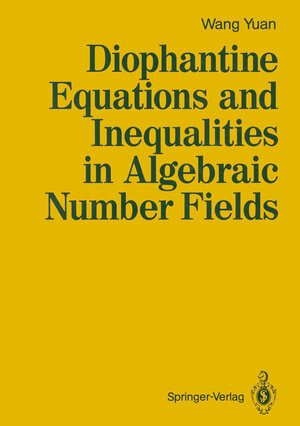
×
![Buchcover ISBN 9783642634895]()
Diophantine Equations and Inequalities in Algebraic Number Fields
von Yuan WangInhaltsverzeichnis
- 1. The Circle Method and Waring’s Problem.
- 1.1 Introduction.
- 1.2 Farey Division.
- 1.3 Auxiliary Lemmas.
- 1.4 Major Arcs.
- 1.5 Singular Integral.
- 1.6 Singular Series.
- 1.7 Proof of Lemma 1.12.
- 1.8 Proof of Theorem 1.1.
- Notes.
- 2. Complete Exponential Sums.
- 2.1 Introduction.
- 2.2 Several Lemmas.
- 2.3 Mordell’s Lemma.
- 2.4 Fundamental Lemma.
- 2.5 Proof of Theorem 2.1.
- 2.6 Proof of Theorem 2.2.
- 3. Weyl’s Sums.
- 3.1 Introduction.
- 3.2 Proof of Theorem 3.1.
- 3.3 A Lemma on Units.
- 3.4 The Asymptotic Formula for N(a, T).
- 3.5 A Sum.
- 3.6 Mitsui’s Lemma.
- 3.7 Proof of Theorem 3.3.
- 3.8 Proof of Lemma 3.6.
- 3.9 Continuation.
- 4. Mean Value Theorems.
- 4.1 Introduction.
- 4.2 Proof of Theorem 4.1.
- 4.3 Proof of Theorem 4.2.
- 4.4 A Lemma on the Set D.
- 4.5 A Lemma on the Set D(x).
- 4.6 Fundamental Lemma.
- 4.7 Proof of Lemma 4.1.
- 5. The Circle Method in Algebraic Number Fields.
- 5.1 Introduction.
- 5.2 Lemmas.
- 5.3 Asympotic Expansion forSi (?, T).
- 5.4 Further Estimates on Basic Domains.
- 5.5 Proof of Theorem 5.1.
- 5.6 Proof of Theorem 5.2.
- 6. Singular Series and Singular Integrals.
- 6.1 Introduction.
- 6.2 Product Form for Singular Series.
- 6.3 Singular Series and Congruences.
- 6.4 p-adic Valuations.
- 6.5 k-th Power Residues.
- 6.6 Proof of Theorem 6.1.
- 6.7 Monotonic Functions.
- 6.8 Proof of Theorem 6.2.
- 7. Waring’s Problem.
- 7.1 Introduction.
- 7.2 The Ring Jk.
- 7.3 Proofs of Theorems 7.1 and 7.2.
- 7.4 Proof of Theorem 7.3.
- 7.5 Proof of Theorem 7.4.
- 8. Additive Equations.
- 8.1 Introduction.
- 8.2 Reductions.
- 8.3 Contraction.
- 8.4 Derived Variables.
- 8.5 Proof of Theorem 8.1.
- 8.6 Proof of Theorem 8.2.
- 8.7 Bounds for Solutions.
- 9. Small Nonnegative Solutions of Additive Equations.
- 9.1 Introduction.
- 9.2Hurwitz’s Lemma.
- 9.3 Reductions.
- 9.4 Continuation.
- 9.5 Farey Division.
- 9.6 Supplementary Domain.
- 9.7 Basic Domains.
- 9.8 Proof of Theorem 9.1.
- 10. Small Solutions of Additive Equations.
- 10.1 Introduction.
- 10.2 Reductions.
- 10.3 Continuation.
- 10.4 Farey Division.
- 10.5 Supplementary Domain.
- 10.6 Basic Domains.
- 10.7 Proof of Theorem 10.1.
- 11. Diophantine Inequalities for Forms.
- 11.1 Introduction.
- 11.2 A Single Additive Form.
- 11.3 A Variant Circle Method.
- 11.4 Continuation.
- 11.5 Proof of Lemma 11.1.
- 11.6 Linear Forms.
- 11.7 A Single Form.
- 11.8 Proof of Theorem 11.1.
- References I.
- References II.




